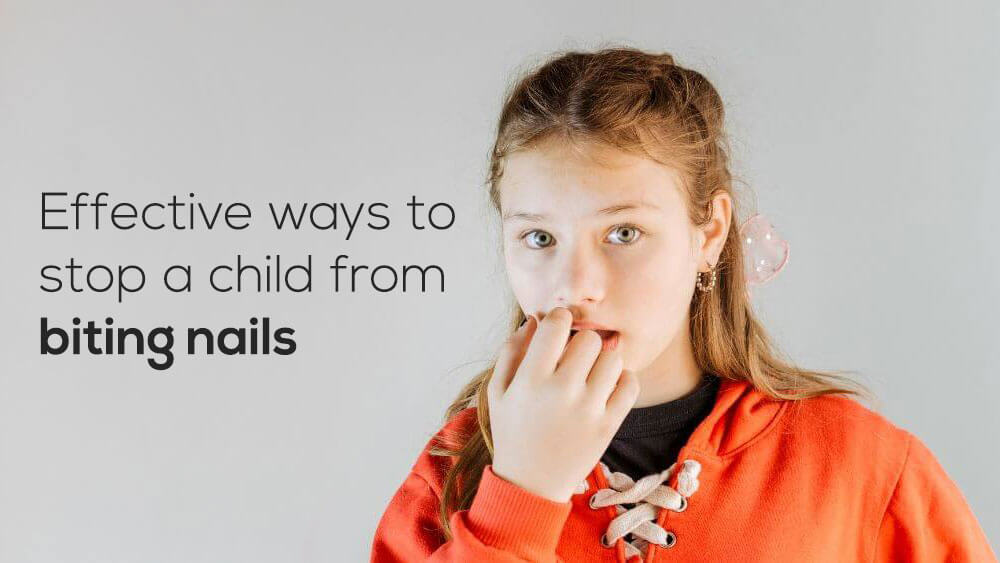Effective ways to stop a child from biting nails

Introduction:
Biting nails is perfectly “normal”, so nothing to worry about. Secondly, there are some very simple tips on how to stop a child from biting nails. Try your best to understand the root cause behind why your child is biting nails.
Why do toddlers bite?
Children bite their nails for a number of reasons and the majority of them aren’t intentional. Some of the significant reasons are listed below:

1. Lack of language skills:
Lack of language skills can be the primary reason behind your toddler developing the habit of nail-biting. Your toddler is probably unable to express strong feelings like frustration, joy, anger, etc. hence biting nails becomes a substitute for not being able to express his/her emotions like for e.g. I am really excited, I want to play in the park, I don’t want to eat that food, etc.
2. Are experimenting to see what will happen:
Your tiny tot is often curious to experiment and test his/her body capabilities. He/she is into experimenting mode, thinking, “Wow, let me see what I can do with my teeth.”
Child development experts say that a toddler biting nails is something very natural for them because they get curious about their new set of teeth.
3. Need more active playtime:
Playing is crucial for your child’s social, emotional, physical, and cognitive growth. It’s your child’s way of learning about the body and the world around. So, if your toddler is deprived of his/her playtime naturally your child needs more active time. Hence, they tend to develop a nail-biting habit.
4. Are exhausted:
Toddlers often don’t understand when the exertion hits. They want to play on and eventually are tired. This eventually results in the habit of biting nails. Your kid needs sleep if he is not able to get it, it results in restlessness and restless behavior can result in such kinds of habit.
5. They are teething:
Babies bite nails because many times they are teething which gives them a yearning to put things in their mouth. Nail biting is believed to be relieving the teething pain to some extent.
6. Have a need for oral stimulation:
Nail biting is often associated with anxiety and frustration. The act of chewing nails apparently relieves stress, tension, or boredom. Kids who are habitually are into biting the nails feel bored, nervous, lonely, or just because they are hungry. Nail biting can also be a habit transferred from toddler years of thumb or finger sucking.
7. They might be in pain:
Toddlers bite when they are in pain. Your kid may not be able to express what he/she is feeling, this kind of pain hence results in biting habit. Since they are not able to express their emotions in words so when they face any unbearable situation, they tend to bite nails.
8. They need an outlet for their feelings:
Feeling frustrated, not being able to express their emotions or not able to convey properly what they wish to express is the prominent reason for biting nails among toddlers. Biting and hitting are ways for children to assert themselves. If a child is feeling frustrated or out of control and cannot appropriately state their feelings, they may act out by biting.

9. They’re craving attention:
Another reason your toddler biting nails can be an attention seeking behavior. When your little one is feeling left out he/she starts developing anxiety, which further builds frustration hence, the nail-biting happens.
Once your kid starts receiving attention, care and attention, eventually your kid discontinues the nail-biting behavior.
10. They’re frustrated:
Keep checking your toddler’s behavior; does he get frustrated, annoyed or infuriated when he bites his nails? All of these emotions are normal, but responding in an aggressive manner or punishing is not a good idea.
So, have patience and understand that it is perhaps a phase that your kid needs to get through. There are several tips to prevent your child from nail biting, you can practice either of it and see which one works.
Key strategies to stop a child from biting nails:
1. Distract your child with a toy or book:

The goal is to distract your kid from nail-biting habit as much as possible. Suggest reading a book or playing a game or do some indoor activity where you can engage your child for a longer period of time and this is how eventually the habit will go away.
2. Suggest ways to share:
Know what is triggering in your child’s mind which leads to nail-biting. Is your child being anxious about something? Is there some kind of fear or there is something which is bothering? Or it is plainly a passing phase where many of the toddlers go through?
3. Give your child enough attention:
Your child might be attention deprived and perhaps he has got into the nail-biting habit. It is crucial that you give enough attention to your kid throughout your day, which will let him/her forget about their biting habit.
Paying extra attention can help a lot especially when your kid is going through major life changes, such as moving to a new location or welcoming a baby sibling.
If your child is susceptible to the nail-biting habit, have playmates or more of sleepover activities and step in when a squabble or argument appears to be brewing.
4. Give positive attention to the bitten toddler:
Explain your child in a calmer fashion that “nail-biting” is not a good habit. Show them a few examples where nail-biting kids do not get attention. Make sure that the examples you set are explained in a positive manner hence, this way your child comes to an understanding that it is a bad habit and harmful to the body, overall creating a bad impression.
5. If the baby is teething:
Practicing prevention can help especially when your child is teething. The toddlers tend to have that craving and some discomfort in his mouth when he is getting the first set of teeth. When your toddler is teething you make sure to carry the teething ring along with or some soft cloth to minimize the teething craving hence, it is less likely to sink the teeth and hurt anyone.
Avoid such situations where your child can get irritable enough to bite. Make sure that you are carrying all your child’s needs. If you are going to a public place or have an occasion to attend make sure that your kid is well feed, had his nap and comfortable. Have some snack to soothe your child teething crankiness.
6. You don’t need to wait until next time:
Guessing why toddlers bite can be helpful in predicting when and why this behavior triggers. Knowing you’d be able to intervene immediately helping your child and protecting other kids.
But to help a child, you don’t need to wait until another bite occurs. Understand the source of the tensions and why the biting occurs. Whether you have thought of a likely cause or not, your helpful actions will aid in bringing down the habit.
7. Special time:
- Parents need to know the difference here, whether it is a problem for them as against problem for their child. Bad habits can be easily broken when parents and children work together–not against each other, says the child development psychologists.
Any time you get into a war like situation, you are going to lose because the child has the ultimate control. Take a positive, team approach.
One simple strategy to apply is to praise your child when he/she doesn’t bite their nails at a time or during an activity that usually triggers the habit. If you pay attention for behaving the way you want, you’ll make more progress than if you focus on the negative.
Closing thoughts:
Stifling your anger for as long as you can and then snapping like, “Stop biting your nails, it’s irritating me!” is asking for another disaster.
As long as your child is not hurting himself and doesn’t seem stressed out, your best bet is to wait out the habit. The less fuss he associates with the nail-biting habit, the more likely he’ll stop on his own when he’s ready — and the more likely he’ll feel comfortable asking you for help.




